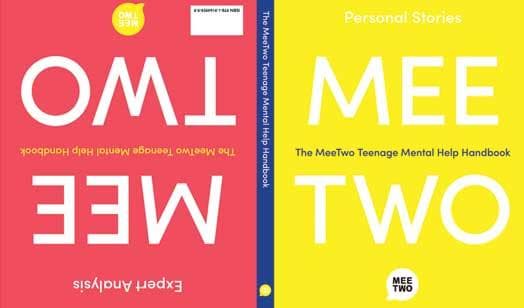
Plenty of food for thought
'MeeTwo Teenage Mental Help Handbook' by Suzi Godson (Ed.) (MeeTwo Education; Pb £12.00). Reviewed by Jon Sutton; with online-only Q&A with the author.
29 November 2018
The MeeTwo Teenage Mental Help Handbook claims to be 'the first publication of its kind', featuring personal stories, expert overviews and a directory of resources covering all kinds of issues facing today's teenagers. Nicely produced and lavishly illustrated, by Yumi Sakagawa and others (including teenagers themselves), it feels engaging and easy for the target audience to dip in and out of.
With the team behind the MeeTwo peer-support app, Editor and Creative Director Suzi Godson (a 'Research Psychologist and author') has split the book into three parts. At one end, personal stories; in the middle, an eclectic mix of support, self-help, apps, books, activities and media on numerous psychological and social issues; and then, turn the book over and starting from the other end is the 'expert analysis'. Personally, I would have preferred to see this in amongst the personal stories, but equally I can see that the book's organisation adds something.
More importantly, the expert input is typically good stuff from Sarah-Jayne Blakemore, Sir Simon Wessely, Lord Richard Layard, Henrietta Bowden-Jones, and more. It doesn't get bogged down in academic speak but seems suitably cautious on areas often overtaken by hyperbole… for example, Godson herself writes: 'When we launched MeeTwo, we were waiting for young people to blame their distress on social media. We are still waiting. …anyone who believes social media can affect young people in a negative way must, by extension, accept that it has the potential to influence them in a positive way too.'
But it's the personal stories that are likely to strike a chord with a teenage audience. This is a time when, as Blakemore says, 'we are developing our sense of self'. The 'lived experience' of peers, in domains as varied as body hair and divorce, revision and suicide, is pretty easy to come by in our social media saturated world. But how often is it presented in honest, bite-sized chunks with plenty of extra food for thought for those hungry for more?
I'm yet to try out the app, but I'll definitely be taking a look at it alongside the book with my teenage son. All that remains is to continue my quest for the parental equivalent… there are online resources and support groups aplenty for new parents, but far less specifically aimed at parents of teenagers. A gap that psychologists, and potentially MeeTwo, could look to fill.
- Reviewed by Jon Sutton, Editor of The Psychologist.
Why is it called MeeTwo?
It is an expression of empathy. I came up with the name long before the #MeToo movement. It was originally spelt Me2, but that turned out to be an Italian gay porn app.
You've got a Masters in Psychology from Birkbeck. How would you say you've put that to use in this venture?
I'm just finishing up my psychology PhD at BBK. My supervisor is Jonathan Smith and I am using the qualitative research method IPA (Interpretive phenomenological analysis) which he invented. My area of expertise is sex and relationships and I love working with IPA because it can capture the essence of any experience.
About me: I am The Times sex and relationships columnist and have written several books; however I am also an ex-Royal College/St Martins graphic design graduate, which is why I am able to do things like design apps and books!
The MeeTwo app is rooted in the principles of positive psychology. For every post a user makes, we ask them to help two other people in turn. There is a wealth of research to show that the best way to help yourself is to help someone else and the peer support model allows young people to use their difficult experiences in a positive way. Young people who have, for example, been through CAMHS can help other young people who are scared about their first appointment. This also makes the app uniquely scalable, unlike 1-2-1 counselling models.
I would have thought that teenagers encounter more 'personal stories' around mental health than ever these days, via social media and YouTube. Are you confident they'll still respond to a physical book and a moderated app?
The book emerged almost organically as young people began to tell us their stories by email. We realised that it was important to publish them because they illustrate how complex and multi layered mental health issues can be. We also knew that there were loads of great support resources for young people out there, but the only one they know about is Childline. We could have put them all in a website, but you have to actively search a website, whereas you can find things in a book serendipitously.
What next?
MeeTwo is part of the 2018 Digital Health London cohort which is a pathway to NHS procurement. The demand for CAMHS services is overwhelming so apps like MeeTwo provide much needed support to young people who need help but don't meet the threshold for treatment.
We funded the first print run with Kickstarter and for every copy we sell we will send a copy free to a secondary school. We are hoping that corporates might sponsor additional print runs so that we can get on win every school library in the country.
You can buy the book on Waterstones